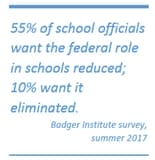Paperwork takes staff away from daily responsibilities and educating kids, officials say
By JULIE GRACE | Nov. 13, 2017
In an ideal world, Jeff Kasuboski, superintendent of the Wautoma Area School District in central Wisconsin, would revamp his after-school program. Rather than students interacting only with kids their own age, he’d have them volunteer and spend time with an “untapped resource” — senior citizens.
But because the coordinator of the after-school program, which is partially financed with federal dollars, spends nearly 50 percent of her time also applying for and administering all of the district’s federal grants, as well as complying with their voluminous regulations, she doesn’t have time to coordinate visits by students to nursing homes, community centers or to seniors’ private homes. And Kasuboski doesn’t expect that to change.
“I just don’t see federal regulations getting less restrictive anytime soon,” he says.
Wautoma’s experience is not unique. Of the 451 local school officials who responded to a Badger Institute survey this summer, 56 say their district was forced to hire additional staff to keep up with the administration of federal grants, which help fund everything from special education to school lunches. Another 85 officials say they would hire more staff if their district could afford to. The two groups accounted for 31 percent of the officials who responded to the survey. And many of those who say they manage grants with current staff complain it often means overtime and added stress for their office employees.
All of this is expensive. Grants specialists, with their skills and experience dealing with federal red tape, don’t come cheap. The West Allis-West Milwaukee School District, for instance, hired a grants administrator at an annual salary of $116,000 in early 2016 after the district ran afoul of federal record-keeping requirements.
Not everyone who oversees school grants has that title, of course. In some cases, a district may add a bookkeeper or assistant business manager who may have other duties. Some districts hire outside contractors to write and assess federal grants with the understanding that if the grant is approved, the contractors are paid a percentage of the federal money. In some cases, assistance with grants is provided by Cooperative Educational Service Agencies, or CESAs. CESA 6, based in Oshkosh, for instance, assists 11 school districts with writing and managing federal grants through its GROW consortium.
Like many other districts, the Butternut School District in Ashland County uses its entire office staff — a secretary, payroll manager, finance manager and superintendent — to manage its federal grants.
“We are constantly checking regulations and changes in regulations,” says Butternut Superintendent Joe Zirngibl. “My staff puts in lots of overtime to compensate for the extra time necessary to do the reporting.”
Paperwork outweighs dollars
While federal funding generally accounts for about 10 percent of school funding, officials say the regulatory burden far outweighs the dollars schools receive. But they take it anyway, officials say, because of the perception that they would be turning down “free” federal money.
In the small Swallow School District in Waukesha County, federal grant amounts are usually $1,000 or less, Business Manager Jeremy Struss says.
“We still have to meet all of the federal regulations that a district receiving hundreds of thousands of dollars would,” he says. “In some ways, receiving the small amount of funds isn’t worth the effort since meeting these regulations doesn’t add anything to our educational program.”
Oftentimes, school district employees are unable to maintain or adequately perform their daily duties because of federal reporting requirements, officials say. Most of the respondents in the Badger Institute’s survey say federal paperwork takes teachers away from the classrooms. Those in rural schools feel this most keenly, with 62 percent of respondents from rural areas indicating this.
Chris Metras, superintendent of the Beecher-Dunbar-Pembine School District in Marinette County, for example, says he spends 30 percent of his time fulfilling federal reporting requirements, taking him away from core duties such as community engagement, personal development and planning school curriculum.
Many district officials say they are willing to provide pertinent data and information to the federal government for accountability purposes, but frustrations arise when it overwhelms their staff and takes them away from essential responsibilities. Two-thirds of survey respondents — including 80 percent of urban district officials — say federal paperwork is “very” or “extremely” time-consuming. Additionally, 60 percent of the respondents overall and 65 percent of those in urban districts say federal rules do little to support oversight and accountability.
“There seems to be much hoop-jumping to satisfy some politicians’ thirst for accountability on our part, yet they rarely consider the additional time, energy, blood, sweat and tears that go into gathering all of the data and getting the reports submitted in a timely manner,” says Chris VanderHeyden, superintendent of the Menasha Joint School District, with an enrollment of more than 3,500 students.
“I can’t tell you how many times I have seen some of my folks on the verge of tears as they attempt to meet the deadlines amidst databases that aren’t playing nice together or efforts to interpret exactly what information is supposed to be reported and in what format,” VanderHeyden says.
Most district officials — 55 percent — who completed the survey say they’d like to see the feds’ role in education reduced, with another 10 percent wanting the federal role eliminated altogether.
Education of children wouldn’t suffer much, and might even improve, if the federal regulatory burden was lightened, officials say, since the focus of the grants bureaucracy is on compliance, not on educational outcomes.
“It’s important that there’s some metrics used to make sure grants are being successful because otherwise we’re throwing money down a black hole, says Mike Trimberger, superintendent of the Random Lake School District. “But some schools would argue it’s not even worth it due to administration costs.”
One business manager responds in the Badger Institute survey: “We are all for accountability for our actions, but sometimes the regulations that we have to follow take us away from the most important job at hand — and that is producing the best possible outcome for our students.”
Julie Grace, a graduate student studying communications at Marquette University, is an intern at the Badger Institute.
► Related story: Invasion of the federal bean counters
Survey questions and answers cited in this story
Which of the following statements most closely matches your
district’s experience in dealing with the reporting requirements
for federal education funds?
| Answer choices | Response percentage | Responses |
| Federal reporting requirements are so complex, contain so much red tape and compliance penalties are so onerous, the district hashad to hire additional and/or expert staff to managefederal grant programs and oversee their implementation. | 12.42% | 56 |
| Despite the challenges of satisfying federal reporting requirements, the district’s regular business staff have been able to manage federal grant programs and their implementation. | 68.74% | 310 |
| Budget constraints do not allow us to add staff to help manage federal grants, but we would do so if funds were available. | 18.85% | 85 |
| Total | 451 |
Which of the following statements comes closer to your view
about the accompanying paperwork from the federal government?
| Answer choices | Response percentage | Responses |
| Paperwork associated with federal education funding too often takes teachers and other staffaway from the classroom and otherwise working with students. | 59.42% | 268 |
| Paperwork associated with federal education funding does not disrupt the efforts of teachers and staff working with students. | 40.58% | 183 |
| Total | 451 |
If local school officials had more discretion over how federal
funds were spent, do you think there would be much more,
somewhat more, about the same, somewhat less or much l
ess accountability in how federal funds are spent
than there is now?
| Answer choices | Response percentage | Responses |
| There would be much more accountability. | 11.09% | 50 |
| Somewhat more | 19.73% | 89 |
| About the same | 50.11% | 226 |
| Somewhat less | 10.86% | 49 |
| Much less accountability | 3.33% | 15 |
| Don’t know | 4.88% | 22 |
| Total | 451 |
And what about the following two statements about reporting
requirements from the federal government? Which comes
closer to your view?
| Answer choices | Response percentage | Responses |
| Federal government reporting requirements are critical for ensuring the necessary oversight and accountability of public schools. | 40.80% | 184 |
| Federal government reporting requirements do very little to support the necessary oversight and accountability of public schools. | 59.20% | 267 |
| Total | 451 |
Wisconsin school superintendents, business managers and
school board members were asked to complete the
sentence, “In your view, federal involvement in local
education should be …”
| Answer choices | Response percentage | Responses |
| Increased. | 7.98% | 36 |
| Remain the same. | 20.18% | 91 |
| Reduced. | 55.43% | 250 |
| Eliminated. | 9.98% | 45 |
| Don’t know. | 6.43% | 29 |
| Total | 451 |
About the survey
The Badger Institute (formerly known as the Wisconsin Policy Research Institute) survey was conducted in July and August. Surveys were sent to 2,460 local school superintendents, school board members and business managers in all 424 Wisconsin public school districts to get their opinions on federal funding of local schools. All told, 451 out of 2,460 officials responded to the survey — an 18.33 percent response rate. The survey was conducted through Survey Monkey and sent to officials via email. The questions were multiple choice, but respondents were given the opportunity to comment. Their answers and comments were anonymous unless the respondents gave permission that their names and titles be used for publication. Some were contacted by phone and email for additional comments.







